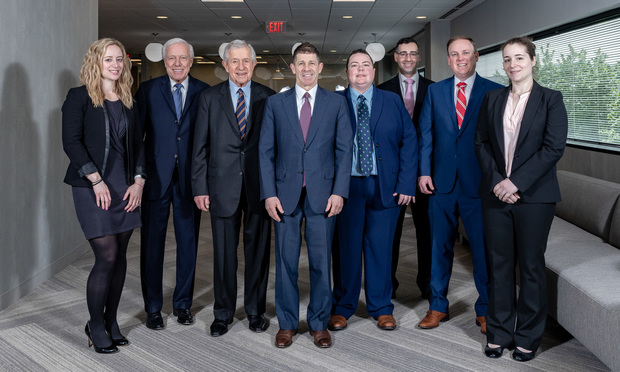Pashman Stein Appellate Group Looked to 'Build Reputations One Day at a Time' in 2018
"We care, and we are willing to bleed for our clients. We understand that as individual lawyers and as an institution, we build our reputations one day at a time."
May 31, 2019 at 04:34 PM
7 minute read
 From Left to right: Janie Byalik, Justin P. Walder, Gary S. Stein, Michael S. Stein, CJ Griffin, David N. Cinotti, Brendan M. Walsh, Suzanne Bradley
From Left to right: Janie Byalik, Justin P. Walder, Gary S. Stein, Michael S. Stein, CJ Griffin, David N. Cinotti, Brendan M. Walsh, Suzanne Bradley
The appellate litigation group at Pashman Stein Walder Hayden in Hackensack handled numerous important cases, and saw its share of successes, in 2018. The group obtained a ruling from the Appellate Division that the NJSPCA is subject to the state Open Public Records Act as an arm of the state, leading to legislation to codify the ruling. Pashman Stein also represented OPRA plaintiffs in a case yielding an Appellate Division ruling that the statute's applicability isn't limited to New Jersey residents. In another, the state Supreme Court held “the sale of government property at a public auction is a quintessential public event that calls for transparency.” And in Petro-Lubricant Testing Labs., Inc. v. Adelman, Pashman Stein represented a blogger sued for defamation, and argued successfully before the high court that minor changes to digital articles don't constitute republication for purposes of restarting the statute of limitations on a libel claim.
*Editor's Note: Managing partner Michael Stein provided the following responses.
What were some of the department's most satisfying successes of 2018, and why?
Pashman Stein Walder Hayden's appellate practice section had a banner year in 2018, including several successful decisions that resulted in published opinions. We continue to litigate issues of first impression and are committed to advancing our clients' interests on appeal where appropriate. PSWH is known for handling large, complex commercial matters as well as issues of consequence to the state of New Jersey, often setting significant precedents.
One notable victory in 2018 of which we are particularly proud was Scheeler v. Atl. Cnty. Mun. Joint Ins. Fund, 454 N.J. Super. 621 (App. Div. 2018), which began when a North Carolina resident sought government records from two New Jersey public agencies. Both agencies denied the requests, and separate lawsuits were filed. In one case, an Atlantic County judge ruled that Scheeler was prohibited from filing Open Public Records Act (OPRA) requests because he was not a New Jersey citizen. In the other case, a Burlington County judge ruled that OPRA has no standing requirement and “any person” can file an OPRA request. Both decisions were appealed and were consolidated with a third matter in which the Atlantic County judge had decided that a nonprofit civil rights organization that was incorporated in Washington, D.C., could not access records under OPRA. Thankfully, the Appellate Division issued a published opinion and ruled that OPRA is not limited only to New Jersey citizens, despite Section 1's declaration that “government records shall be readily accessible for inspection, copying, or examination by the citizens of this State.” The court instead looked to numerous other provisions of OPRA that were more specific and referred to “any person” or “a requestor” and it concluded that non-citizens can also file OPRA requests.
Had the Appellate Division ruled differently, the results would have been devastating to transparency. Out-of-state reporters and news agencies would have been precluded from using OPRA, as well as non-residents who own homes in the state.
Being a Litigation Department of the Year means more than providing good counsel. How does your group go a step further for clients?
We care, and we are willing to bleed for our clients. We understand that as individual lawyers and as an institution, we build our reputations one day at a time. We carry that burden with pride and resolute determination in furtherance of our effort to be recognized as among the finest litigation departments, anywhere.
Amid a changing market for legal services, what does it mean to be an effective litigator in New Jersey?
We believe that, regardless of where we are practicing, the single most important set of qualities possessed by any effective litigator is a passion for the work, the capacity to sweat the details, and an ability to own each client's problem as if it was the problem of a loved one. That does not change, and it has been our mission to attract and retain attorneys who share that passion, commitment, and love of the craft.
Is it true that clients now more than ever wish to avoid litigation, and if so, how do litigation practices thrive?
Litigation practices can thrive when they build trust with their clients by serving as business partners while also providing great legal services. We approach the question of whether litigation is advisable as if the financial investment were our own. The question we pose to our clients is whether an investment in a litigation would be the best use of their money. What are the risks, the benefits, and the expected return? We view our job as to counsel against litigation unless the potential return on the investment makes it worthwhile. Having said that, we fully appreciate that each client may consider different factors specific to their own business before embarking on a litigation strategy, including whether to appeal a decision, such as cost and reputational impact. Indeed, our litigation attorneys are frequently engaged by companies on issues that can have significant impact on their businesses. While these companies are not necessarily looking to avoid litigation, they trust our advice as to the management of the case and the considerations involved for pursuing a settlement or going to trial or taking a matter on appeal. We appreciate that, no matter which route is chosen, in-house counsel want to avoid surprises and control costs as much as possible. From the start of our engagements, we work with them to manage the matter, predict fees and the scope of work, and to establish the processes we will utilize for communications and billing.
Litigators are extraordinarily busy people. What does the firm do to ensure that they remain engaged with pro bono work, their communities and their families?
At times, our matters can become all-encompassing, especially with the high-stakes litigation we do for many clients. Nonetheless, we have devoted considerable time, resources, and money to work/life balance issues. For example, it is with conscious forethought, and pride, that we offer an exceedingly generous maternity/paternity program, flexible schedules, the capacity to work at home and in-office personal training. We accept fully our responsibilities to all of our employees to do whatever we can to help each of them to find the balance that works for them, without sacrificing our professional standards. And we hope in the near future to be able to announce the commencement of a sabbatical program, which is presently in review. This effort is in furtherance of our objective to make sure our employees understand how much we care about and value them.
To further answer your question, we have purposefully endeavored to become one of the go-to law firms for high-impact pro bono policy litigations. In that regard, we are at the forefront on issues connected to government transparency, free speech, and the integration of our state's public schools. Our commitment to this work allows us to send a message both internally and externally that the practice of law is more than just a business. We believe it is our responsibility as lawyers and as a law firm to lean in, contribute to the public good, and give back. We believe this commitment serves as a source of pride to our employees and it furthers our objective to build an institution that will endure.
The firm also encourages its attorneys to become actively involved in academic, civic, cultural, political, and religious organizations that interest them. As a result, most of our attorneys are currently serving in leadership positions within various organizations throughout the area.
Our attorneys have become leaders in bar associations, philanthropic organizations, and served on the boards of various education institutions. They have been appointed to state and local boards, councils and commissions and have been elected to public offices.
This content has been archived. It is available through our partners, LexisNexis® and Bloomberg Law.
To view this content, please continue to their sites.
Not a Lexis Subscriber?
Subscribe Now
Not a Bloomberg Law Subscriber?
Subscribe Now
NOT FOR REPRINT
© 2025 ALM Global, LLC, All Rights Reserved. Request academic re-use from www.copyright.com. All other uses, submit a request to [email protected]. For more information visit Asset & Logo Licensing.
You Might Like
View All
Lack of Jurisdiction Dooms Child Sex Abuse Claim Against Archdiocese of Philadelphia, says NJ Supreme Court
5 minute read
Loopholes, DNA Collection and Tech: Does Your Consent as a User of a Genealogy Website Override Another Person’s Fourth Amendment Right?

Was $1.3M in 'Incentive' Payments Commission? NJ Justices Weigh Arguments
3 minute readTrending Stories
- 1SEC Sued for Failing to Reveal Records Involving Simpson Thacher Attorney
- 2Lawsuit accuses University of California of racial discrimination in admissions
- 3Data Breaches in UK Legal Sector Surge, According to ICO Data
- 4PayPal Faces New Round of Claims; This Time Alleging Its 'Honey' Browser Extension Cheated Consumers
- 5Fired NLRB Member Seeks Reinstatement, Challenges President's Removal Power
Who Got The Work
J. Brugh Lower of Gibbons has entered an appearance for industrial equipment supplier Devco Corporation in a pending trademark infringement lawsuit. The suit, accusing the defendant of selling knock-off Graco products, was filed Dec. 18 in New Jersey District Court by Rivkin Radler on behalf of Graco Inc. and Graco Minnesota. The case, assigned to U.S. District Judge Zahid N. Quraishi, is 3:24-cv-11294, Graco Inc. et al v. Devco Corporation.
Who Got The Work
Rebecca Maller-Stein and Kent A. Yalowitz of Arnold & Porter Kaye Scholer have entered their appearances for Hanaco Venture Capital and its executives, Lior Prosor and David Frankel, in a pending securities lawsuit. The action, filed on Dec. 24 in New York Southern District Court by Zell, Aron & Co. on behalf of Goldeneye Advisors, accuses the defendants of negligently and fraudulently managing the plaintiff's $1 million investment. The case, assigned to U.S. District Judge Vernon S. Broderick, is 1:24-cv-09918, Goldeneye Advisors, LLC v. Hanaco Venture Capital, Ltd. et al.
Who Got The Work
Attorneys from A&O Shearman has stepped in as defense counsel for Toronto-Dominion Bank and other defendants in a pending securities class action. The suit, filed Dec. 11 in New York Southern District Court by Bleichmar Fonti & Auld, accuses the defendants of concealing the bank's 'pervasive' deficiencies in regards to its compliance with the Bank Secrecy Act and the quality of its anti-money laundering controls. The case, assigned to U.S. District Judge Arun Subramanian, is 1:24-cv-09445, Gonzalez v. The Toronto-Dominion Bank et al.
Who Got The Work
Crown Castle International, a Pennsylvania company providing shared communications infrastructure, has turned to Luke D. Wolf of Gordon Rees Scully Mansukhani to fend off a pending breach-of-contract lawsuit. The court action, filed Nov. 25 in Michigan Eastern District Court by Hooper Hathaway PC on behalf of The Town Residences LLC, accuses Crown Castle of failing to transfer approximately $30,000 in utility payments from T-Mobile in breach of a roof-top lease and assignment agreement. The case, assigned to U.S. District Judge Susan K. Declercq, is 2:24-cv-13131, The Town Residences LLC v. T-Mobile US, Inc. et al.
Who Got The Work
Wilfred P. Coronato and Daniel M. Schwartz of McCarter & English have stepped in as defense counsel to Electrolux Home Products Inc. in a pending product liability lawsuit. The court action, filed Nov. 26 in New York Eastern District Court by Poulos Lopiccolo PC and Nagel Rice LLP on behalf of David Stern, alleges that the defendant's refrigerators’ drawers and shelving repeatedly break and fall apart within months after purchase. The case, assigned to U.S. District Judge Joan M. Azrack, is 2:24-cv-08204, Stern v. Electrolux Home Products, Inc.
Featured Firms
Law Offices of Gary Martin Hays & Associates, P.C.
(470) 294-1674
Law Offices of Mark E. Salomone
(857) 444-6468
Smith & Hassler
(713) 739-1250







